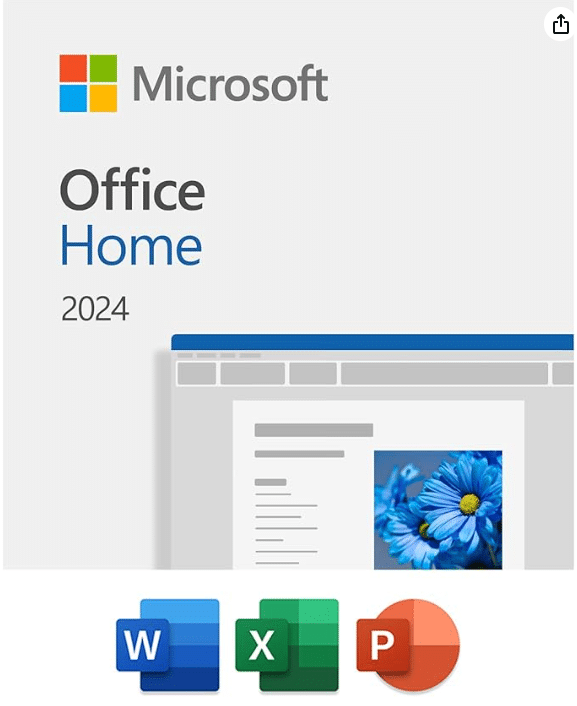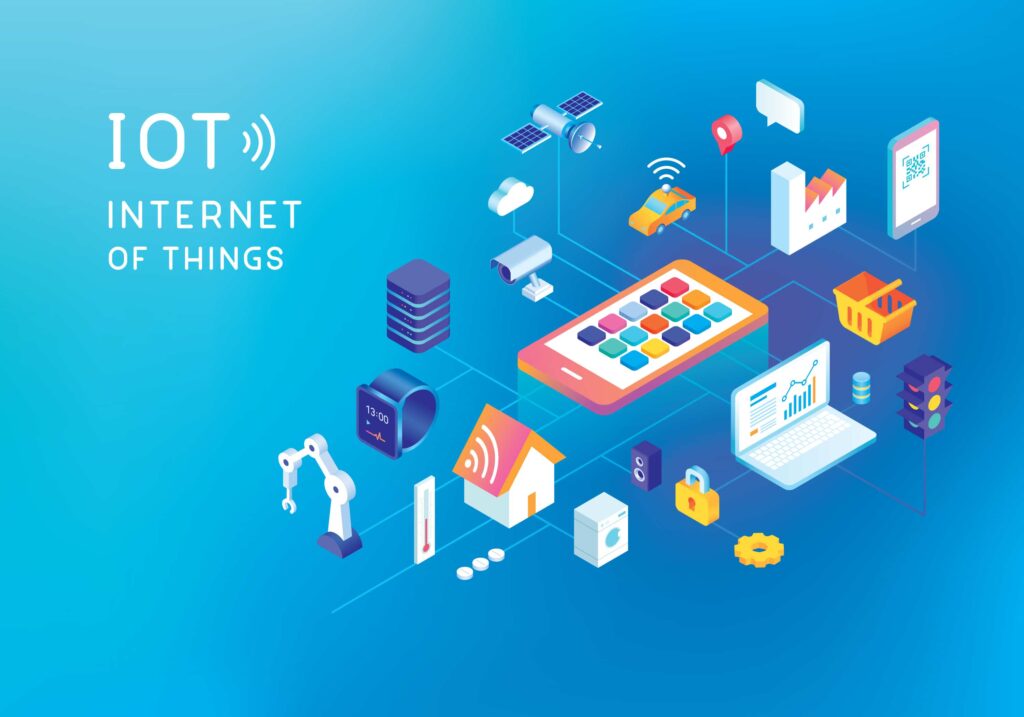
Have you ever wondered how many devices are connected to the internet? According to some estimates, there are over 35 billion IoT devices worldwide, which is expected to grow to 75 billion by 2025. That’s more than ten devices for every person on the planet! But what exactly is IoT, and why should you care?
By the end of this article, you will have a clear and comprehensive understanding of the top IoT companies in 2024 and their innovative solutions. You will also be able to choose the best IoT company for your business in 2024 and leverage the power of IoT to achieve your goals and objectives.
Table of Contents
What are IoT Companies?
IoT, or the Internet of Things, is the term used to describe the network of physical objects, such as devices, vehicles, appliances, and sensors, that are connected to the internet and can communicate, collect, and exchange data.
IoT companies specialize in creating, developing, or providing IoT solutions. IoT solutions are products or services that use IoT technology to connect and interact with physical objects, such as IOT devices, Smart appliances, and sensors, and enable them to collect and exchange data over the internet. IoT companies help their customers and users leverage the power of IoT to achieve various goals and benefits, such as improving efficiency, productivity, innovation, and customer satisfaction.
Depending on the IoT solutions they offer, there are different types of IoT companies. This article will focus on four main types of IoT companies: IoT services companies, IoT software companies, IoT platform companies, and IoT device manufacturing companies.
Why are companies getting into IoT?
IoT is not just a buzzword or a trend. It is a strategic and technological shift reshaping how businesses operate and compete in the market. Companies are getting into IoT for various reasons, but the main one is to gain a competitive edge and create value for their customers and stakeholders.
IoT offers many benefits for companies, such as:
- Increased efficiency: IoT enables companies to optimize their processes, resources, and assets by automating tasks, reducing waste, and enhancing quality. IoT also allows companies to monitor and control their operations remotely, saving time and money.
- Increased productivity: IoT enables companies to improve their performance, output, and outcomes by enabling real-time data collection, analysis, and decision-making.
- Increased innovation: IoT enables companies to create new products, services, and business models by leveraging the data and insights generated by IoT devices and systems. IoT also enables companies to experiment and test new ideas faster and cheaper and to adapt and respond to changing customer needs and market conditions.
- Increased customer satisfaction: IoT enables companies to enhance customer experience, loyalty, and retention by providing personalized, customized, and value-added solutions.
- Increased revenue: IoT enables companies to generate new sources of income by creating new markets, segments, and opportunities.
How we Evaluated Top IoT Companies for Each Category
As seen in the previous sections, IoT companies offer different IoT solutions. To select and rank the top IoT companies in each category, we have used the following criteria and methodology:
Number of employees: We have used the number of employees as a proxy for the IoT companies’ size, scale, and reach. We have obtained the number of employees from the official websites, LinkedIn profiles, or other reliable sources of the IoT companies.
Headquarters location: We have used the headquarters location as an indicator of the IoT companies’ origin, market, and culture. We have obtained the headquarters location from the official websites, LinkedIn profiles, or other reliable sources of the IoT companies.
Key customer names: We have used the key customer names to measure the IoT companies’ reputation, quality, and impact. We have obtained the key customer names from the official websites, case studies, or other reliable sources of the IoT companies.
Details of IoT products or services: We have used the details of IoT products or services to describe the IoT companies’ features, benefits, and value propositions. We have obtained the details of IoT products or services from the official websites, product pages, or other reliable sources of the IoT companies.
Using these criteria and methodology, we have compiled the list of the top IoT companies in 2024 by category, as follows:
Top IoT Services Companies 2024

IoT services companies provide IoT services, such as consulting, integration, and management. IoT service companies help customers and users design, implement, and operate IoT solutions that meet their needs and goals. IoT services companies also support and maintain IoT solutions, ensuring their reliability, security, and performance.
Let’s explore the top IoT service companies in 2024:
1. AllGuard
Company Overview:
Founded in 2015, AllGuard emerged as a trailblazer in the IoT space, driven by a vision to revolutionize healthcare facilities through real-time visibility and patient tracking.
Nestled in the vibrant city of Vancouver, Canada, AllGuard swiftly carved its niche with a dedicated focus on improving operational safety and quality of Health care service.
Size: Over 10,000 employees.
Headquarters: Vancouver, Canada
Key Customers and Industries: hospitals, clinics, and nursing homes.
IoT Services: A cloud-based platform using RFID tags, readers, and software for monitoring staff and patients.
Additional IoT Categories: Healthcare, RFID Technology, IoT Security
Strengths: Focusing on the healthcare sector and innovative IoT solutions.
Weaknesses: Dependence on RFID technology and limited geographic presence.
2. World Wide Technology (WWT)
Company Overview:
Since its inception in 1990, World Wide Technology (WWT) has been a dynamic force shaping the IoT landscape, offering services across manufacturing, retail, transportation, and energy sectors.
Hailing from St. Louis, USA, WWT’s journey has been marked by a commitment to industry optimization and strategic partnerships with global tech giants.
Size: Over 8,000 employees.
Headquarters: St. Louis, USA
Key Customers: Cisco, Dell, Intel, and Microsoft.
IoT Services: Offers consulting, design, integration, testing, and deployment of IoT solutions. Provides training, support, and analytics for IoT solutions.
Additional IoT Categories: Manufacturing, Retail, Transportation, Energy
Strengths: Strengths include a wide range of IoT services and strategic partnerships.
Weaknesses: Lack of differentiation and innovation.
3. EPAM IoT Services
Company Overview:
Founded in 2017 as a subsidiary of EPAM Systems, EPAM IoT Services swiftly became a beacon of innovation, specializing in crafting bespoke IoT solutions across healthcare, automotive, industrial, and consumer domains.
Rooted in Newtown, USA, EPAM IoT Services champions a user-centric approach, providing high-quality solutions tailored to diverse customer needs.
Size: Over 6,000 employees.
Headquarters: Newtown, USA
Key Customers: Philips, BMW, Siemens, and Adidas.
IoT Services: Offers strategy, design, development, testing, and maintenance of IoT solutions.
Additional IoT Categories: Healthcare, Automotive, Industrial
Strengths: Strengths include a customer-centric approach and agile service delivery.
Weaknesses: include dependency on the parent company and limited focus on IoT domains
4. Canopy
Company Overview:
Since its establishment in 2013, Canopy has been at the forefront of IoT service providers, catering to the dynamic needs of retail, hospitality, and entertainment sectors.
Based in the bustling city of Atlanta, USA, Canopy’s journey is characterized by simplicity, ease of use, and a commitment to enhancing customer experience.
Size: Over 4,000 employees.
Headquarters: Atlanta, USA
Key Customers: Walmart, Marriott, and Disney.
IoT Services: Offers a cloud-based platform for managing and optimizing IoT devices.
Additional IoT Categories: Retail, Hospitality, Entertainment
Strengths: Strengths include simplicity and compatibility with various IoT devices.
Weaknesses: Weaknesses include a lack of innovation and a narrow market focus.
5. Fosfor
Company Overview:
In 2019, Fosfor emerged as a powerful force in the IoT arena, representing a joint venture between global IT and consulting giants LTI and Mindtree.
Situated in the tech hub of Bangalore, India, Fosfor swiftly rose to prominence with its data-centric approach, offering advanced and scalable IoT solutions for industries like logistics, agriculture, and mining.
Size: Over 2,000 employees.
Headquarters: Bangalore, India
Key Customers: DHL, Monsanto, and Rio Tinto.
IoT Services: Provides a data-to-decisions product suite for collecting and analyzing IoT data.
Additional IoT Categories: Logistics, Agriculture, Mining
Strengths: Data-centric approach and intelligent IoT solution.
Weaknesses: Weaknesses include newness in the market and dependency on parent companies.
As you can see, there is only one best IoT services company for everyone; therefore, the best IoT services company for you depends on your specific situation and goals. You can choose the best IoT services company for you in 2024 and leverage the power of IoT to achieve your goals and objectives.
Top IoT Software Companies 2024
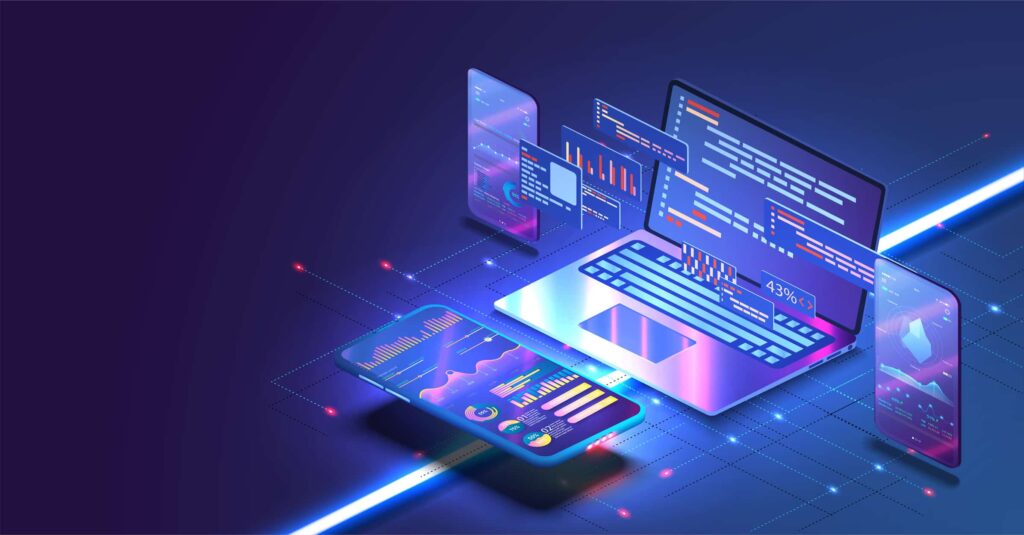
IoT software companies are businesses that develop IoT software, such as applications, platforms, and analytics. IoT software companies create software enabling IoT devices to connect and interact with each other and other systems and services over the internet. IoT software companies also develop software that analyzes and visualizes the data collected and exchanged by IoT devices and provides insights and recommendations for their customers and users.
Let’s explore the top IoT software companies in 2024:
1. Salvo Software
Company Overview:
Founded in 2016, Salvo Software epitomizes innovation in IoT software, addressing the needs of diverse industries such as agriculture, healthcare, and education. Based in the tech hub of San Francisco, USA, Salvo Software has swiftly risen to prominence with over 5,000 employees.
Size: Over 5,000 employees.
Headquarters: San Francisco, USA
Key Customers: John Deere, Pfizer, and Stanford University.
IoT Software: Applications, platforms, and analytics tailored for monitoring and optimizing IoT devices.
Additional IoT Categories: Agriculture, Healthcare, Education
Strengths: Focus on industry-specific needs, user-friendly software
Weaknesses: Dependency on third-party platforms, limited geographic presence
2. SoluLab
Company Overview:
Established in 2014, SoluLab is a beacon of IoT software development, specializing in smart home, smart city, and smart factory solutions.
Size: Over 4,000 employees.
Headquarters: Ahmedabad, India
Key Customers: Nest, Uber, and GE.
IoT Software: Offers applications, platforms, and analytics for managing and enhancing IoT systems. Features blockchain and cloud technologies for security and scalability.
Additional IoT Categories: Smart Home, Smart City, Smart Factory
Strengths: Diverse IoT software, flexible, modular solutions
Weaknesses: Lack of differentiation, innovation
3. Biz4Group LLC
Company Overview:
Since 2003, Biz4Group LLC has pioneered the development of IoT software solutions for the energy, water, and waste management sectors.
Size: Over 3,000 employees.
Headquarters: in Orlando, USA
Key Customers: Tesla, Coca-Cola, and Waste Management.
IoT Software: Applications, platforms, and analytics for monitoring and conserving resources. Features predictive analytics and AI for optimized resource consumption.
Additional IoT Categories: Energy, Water, Waste Management
Strengths: Data-centric approach, high-quality IoT software
Weaknesses: Dependency on parent company, limited sector focus
4. Intive
Company Overview:
With roots dating back to 1999, Intive has been a driving force in IoT software development, serving industries like automotive, media, and finance.
Size: Over 2,000 employees.
Headquarters: Headquartered in Munich, Germany
Key Customers: Audi, Netflix, and PayPal.
IoT Software: Applications, platforms, and analytics facilitating the creation and delivery of digital products. Incorporates cloud, edge, and AI technologies for speed and reliability.
Additional IoT Categories: Automotive, Media, Finance
Strengths: Customer-centric approach, creative IoT software
Weaknesses: Lack of differentiation, innovation
5. Syberry
Company Overview:
Established in 2011, Syberry has been a stalwart in IoT software development, catering to the healthcare, transportation, and education sectors.
Size: Over 1,000 employees.
Headquarters: Austin, USA
Key Customers: IBM, NASA, and Harvard University.
IoT Software: Applications, platforms, and analytics designed for solving complex challenges. Offers custom software development and testing services for tailored solutions.
Additional IoT Categories: Healthcare, Transportation, Education
Strengths: A problem-solving approach, sophisticated IoT software
Weaknesses: Dependency on third-party platforms, limited geographic presence
6. Intent IoT
Company Overview:
Intent IoT, founded in 2018, is a pivotal player in IoT software development, catering to diverse domains, including retail, hospitality, and healthcare. Intent IoT’s IoT software includes applications, platforms, and analytics that help customers and users create, deliver, and enjoy personalized and engaging experiences. Intent IoT’s software also has artificial intelligence and machine learning capabilities that enable their IoT solutions to learn and adapt to customers’ and users’ preferences and behaviors. Intent IoT’s IoT software is user-friendly, customizable, and scalable.
Size: the company boasts a workforce exceeding 2,000
Headquarters: London, UK
Key Customers: Starbucks, Marriott, NHS
IoT Software: Intent IoT provides applications, platforms, and analytics, empowering users to create personalized experiences. With artificial intelligence and machine learning capabilities, their software adapts to user preferences.
Additional IoT Categories: The company also offers consulting, design, and testing services, expanding its impact on the IoT services category.
Strengths: Customer-centric approach, innovative IoT software, and agile software development
Weaknesses: Lack of differentiation, complex software delivery, and facing competition in a saturated market
7. Orange Business Services IoT
Company Overview:
Orange Business Services IoT, a subsidiary of the global telecommunications giant Orange, was established in 2016. They are serving industries like transportation, energy, and agriculture. Orange Business Services IoT’s software includes applications, platforms, and analytics that help customers and users connect, manage, and optimize their IoT devices and systems using various protocols, standards, and APIs. Orange Business Services IoT’s software also provides cloud, edge, and artificial intelligence services that ensure their IoT solutions are scalable, intelligent, and secure. Orange Business Services IoT’s IoT software is flexible, modular, and interoperable.
Size: 9,000+ strong workforce
Headquarters: Paris, France
Key Customers: Schneider Electric, Siemens, Total
IoT Software: The company’s software includes applications, platforms, and analytics, facilitating seamless IoT device management. Cloud, edge, and AI services provide scalable, intelligent, and secure solutions.
Additional IoT Categories: Orange Business Services IoT extends into the IoT services category.
Strengths: Flexibility and modularity, compatibility with various IoT devices and protocols, and collaboration with other Orange products.
Weaknesses: Lack of differentiation, complex service delivery, and competition in a saturated market.
8. Cogniteq IoT
Company Overview:
Founded in 2005, Cogniteq is a prominent player in IoT software development, focusing on education, entertainment, and sports. Cogniteq’s IoT software includes applications, platforms, and analytics that help customers and users create, deliver, and enjoy their digital products and services using IoT devices and systems. Cogniteq’s IoT software also includes cloud, data, and machine learning services, ensuring their IoT solutions are powerful, efficient, and secure. Cogniteq’s IoT software is creative, functional, and valuable.
Size: 1,000+ employees
Headquarters: Minsk, Belarus
Key Customers: Disney, Nike, Coursera
IoT Software: Cogniteq’s software includes applications, platforms, and analytics, enabling the creation and enjoyment of digital products using IoT devices. Cloud, data, and machine learning services enhance the efficiency and power of their IoT solutions.
Additional IoT Categories: Offering design, development, and testing services, Cogniteq actively participates in the IoT services category.
Strengths: Customer-centric approach, creative IoT software, and agile software development.
Weaknesses: Lack of differentiation, complex software delivery, and facing competition in a saturated market.
We have provided a brief overview of each IoT software company and compared and contrasted their strengths and weaknesses. Therefore, the best IoT software company for you depends on your specific needs and goals.
Top IoT Platform Companies 2024
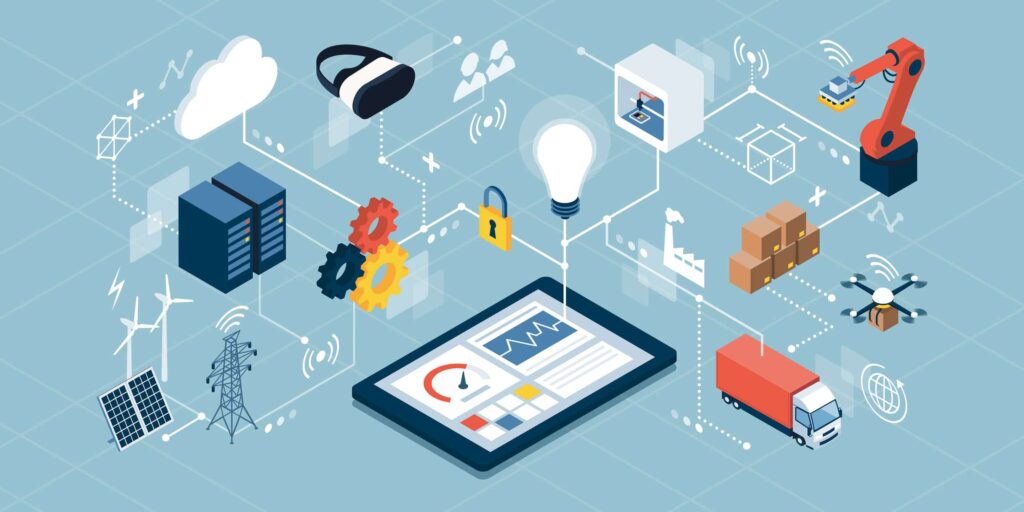
IoT platform companies are businesses that create IoT platforms, which are the infrastructure and tools that enable IoT devices to connect and interact with each other and with other systems and services over the internet. IoT platform companies provide the core functionality and features essential for IoT solutions, such as connectivity, device management, data management, security, and integration. IoT platform companies also provide the flexibility and customization that allow their customers and users to build and deploy their IoT solutions according to their specific needs and goals.
Let’s explore the leading IoT platform companies in 2024:
1. Blynk
Company Overview:
Founded in the bustling tech landscape of New York in 2015, Blynk swiftly evolved into a global player. Blynk’s IoT platform is a low-code software that allows its customers and users to build and deploy their IoT applications using drag-and-drop widgets, code snippets, and templates. Despite being a powerhouse for giants like Samsung, Bosch, and Siemens, Blynk embraces a user-friendly, customizable, and scalable ethos.
Size: Over 10,000 employees.
Headquarters: New York
Key Customers:
Strengths: simplicity, ease of use, and a focus on customer satisfaction.
Weaknesses: Lack of innovation, narrow market focus, and vulnerability to cyberattacks.
2. Microsoft Azure IoT
Company Overview:
Microsoft Azure IoT platform is a comprehensive suite of software and services enabling its customers and users to build and deploy their IoT solutions using various tools, frameworks, and languages. Stepping into the IoT arena in 2016, Microsoft Azure IoT, a subsidiary of the tech titan Microsoft, set the stage for comprehensive IoT solutions.
Size: Over 8,000 employees.
Headquarters:
Key Customers: Starbucks, Walmart, and Shell.
Strengths: commitment to scalability, intelligence, and security in the IoT landscape.
Weaknesses: Microsoft Azure IoT’s weaknesses include complexity, dependency on Microsoft products, and a competitive market.
3. Google Cloud IoT Core
Company Overview:
The Silicon Valley spark birthed Google Cloud IoT Core in 2017, a powerhouse under the Google umbrella. Google Cloud IoT Core offers a fully managed IoT platform that stands out for its flexibility, modularity, and seamless integration with various IoT devices and protocols.
Google Cloud IoT Core’s IoT platform is a fully managed service that allows its customers and users to connect and manage their IoT devices and systems using various protocols, standards, and APIs.
Size: Over 6,000 employees.
Headquarters:
Key Customers: Coca-Cola, Philips, and Spotify
Strengths: excelling in flexibility, modularity, and integration with other Google products.
Weaknesses: Lack of differentiation, complexity in service delivery, and a competitive market.
4. PTC ThingWorx
Company Overview:
Emerging from the vibrant tech hub of Boston in 2009, PTC ThingWorx, a subsidiary of PTC, took the IoT scene by storm. PTC ThingWorx’s IoT platform is an industrial IoT software allowing its customers and users to create, deploy, and manage their IoT solutions using digital twin, augmented reality, and analytics features. PTC ThingWorx ensures robust, reliable, and smart IoT solutions.
Size: Over 4,000 employees.
Headquarters: Boston
Key Customers: Ford, GE, and Schneider Electric
Strengths: industrial IoT focus, sophisticated software, and integration with other PTC products.
Weaknesses: PTC ThingWorx’s weaknesses include complexity, dependency on PTC products, and a competitive market.
5. Exosite
Company Overview:
Minneapolis became the birthplace of Exosite in 2009, a company dedicated to democratizing IoT solutions. Exosite’s cloud-based IoT platform prioritizes simplicity, security, and flexibility. Serving diverse industries, from Garmin to Medtronic, Exosite is renowned for its ease of use, adaptability, and unwavering focus on customer experience. Exosite’s IoT platform is a cloud-based software that allows its customers and users to build and deploy their IoT solutions using connectivity, device management, data management, and integration capabilities.
Size: Over 2,000 employees.
Headquarters: Minneapolis
Key Customers: Garmin and Medtronic
Strengths: simplicity, ease of use, and a focus on customer satisfaction.
Weaknesses: Lack of innovation, a narrow market focus, and vulnerability to cyberattacks.
6. Coreflux IoT
Company Overview:
Established in 2017, Coreflux IoT provides an IoT platform for enterprises and developers. Coreflux’s IoT platform is a software-defined network that enables its customers and users to connect, orchestrate, and optimize their IoT devices and systems using various technologies, such as 5G, edge computing, and blockchain. Coreflux’s IoT platform also provides security, scalability, and reliability services that ensure their IoT solutions are safe, flexible, and dependable. Coreflux’s IoT platform is innovative, powerful, and smart.
Size: 2,000+ employees
Headquarters: San Jose, USA
Key Customers: Cisco, Intel, IBM
Strengths: Innovation and differentiation, support and compatibility with various IoT devices and protocols, and integration with other Coreflux products.
Weaknesses: Complexity and cost, dependency on Coreflux products, and legal and regulatory challenges.
7. Ayla IoT
Company Overview:
Founded in 2010, Ayla offers an IoT platform for businesses and developers. Ayla’s IoT platform is a cloud-based service that allows its customers and users to connect and manage their IoT devices and systems using various features, such as connectivity, device management, data management, and integration. Ayla’s IoT platform also provides security, scalability, and reliability services that ensure their IoT solutions are safe, flexible, and dependable. Ayla’s IoT platform is easy to use and integrate and supports various IoT devices and protocols.
Size: 150+ employees
Headquarters: San Jose, USA
Key Customers: Hamilton Beach, Hunter Fan, Kidde
Strengths: Simplicity and ease of use, support and compatibility with various IoT devices and protocols, and a focus on customer experience.
Weaknesses: Lack of innovation and differentiation, a narrow and niche market, and vulnerability to cyberattacks.
8. Webnms IoT
Company Overview:
Founded in 2001 and a subsidiary of Zoho, Webnms provides an IoT platform for enterprises and developers. Webnms’s IoT platform is software that allows its customers and users to build and deploy their IoT solutions using various capabilities, such as connectivity, device management, data management, and integration. Webnms’s IoT platform also provides cloud, edge, and artificial intelligence services, ensuring their IoT solutions are robust, efficient, and secure. Webnms’s IoT platform is flexible, modular, and interoperable.
Size: 190+ employees
Headquarters: Pleasanton, California, USA
Key Customers: Schneider Electric, Siemens, Honeywell
Strengths: Flexibility and modularity, support and compatibility with various IoT devices and protocols, and integration with other Zoho products.
Weaknesses: Lack of differentiation and innovation, complex and lengthy service delivery, and competition in a saturated market.
9. Balena IoT
Company Overview:
Balena, founded in 2013, specializes in an IoT platform for businesses and developers. Balena’s IoT platform is software that allows its customers and users to develop, deploy, and manage their IoT devices and systems using various tools, frameworks, and languages. Balena’s IoT platform also provides cloud, edge, and container services, ensuring their IoT solutions are compatible, reliable, and secure. Balena’s IoT platform is comprehensive, powerful, and smart.
Size: 20+ employees
Headquarters: London, UK
Key Customers: Tesla, Bosch, Siemens
Strengths: Wide range of IoT software and services, expertise and experience, and strategic partnerships and alliances.
Weaknesses: Complexity and cost, dependency on Balena products, and competition in a saturated market.
This section presents you with the list of the top IoT platform companies in 2024. The choice of the best IoT platform depends on your needs and goals. Selecting the right platform can empower you to leverage the full potential of IoT for your specific objectives.
Top IoT Device Manufacturing Companies 2024
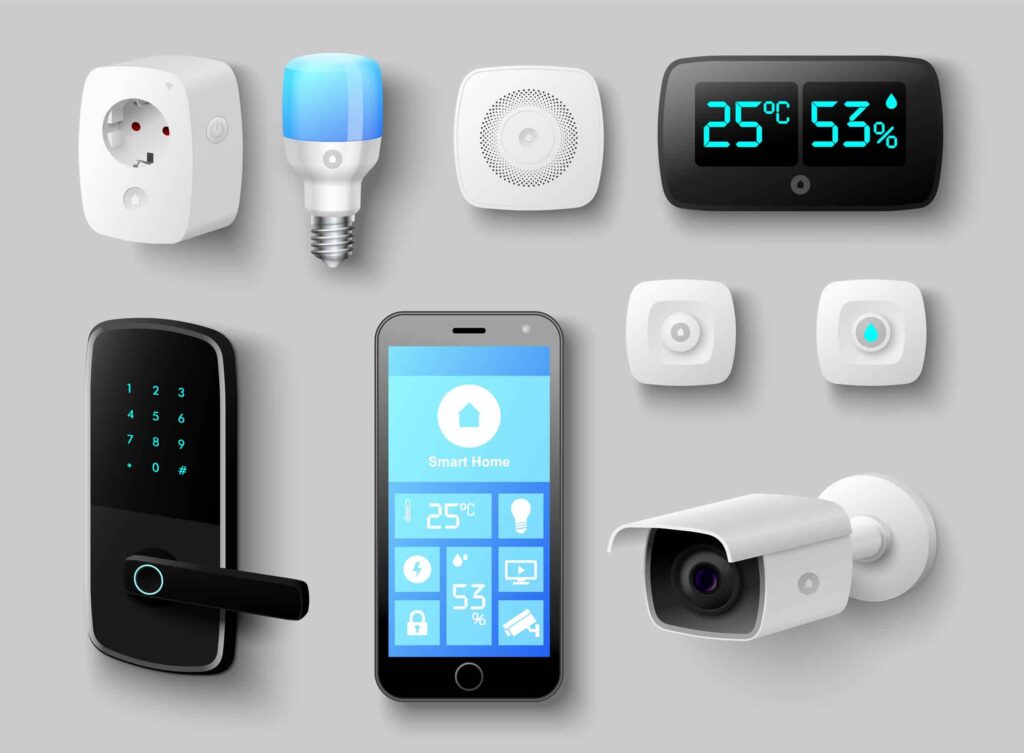
IoT device manufacturing companies manufacture IoT devices like Smart Locks, Smart Camera, Smart Lights etc, which are the hardware and sensors that collect and transmit data over the internet. IoT device manufacturing companies create devices that enable IoT solutions, such as smartphones, smart watches, smart meters, and smart cars. IoT device manufacturing companies also create devices that enhance IoT solutions, such as wearable devices, smart glasses, and smart earbuds.
Let’s explore the top IoT device manufacturing companies in 2024:
1. Samsung
Company Overview:
From its humble beginnings in 1938, Samsung has metamorphosed into a global juggernaut, setting the pace for IoT device manufacturing. Born in Seoul, South Korea, this tech giant has weathered the winds of change and become the harbinger of innovation, influencing domains like consumer electronics, home appliances, and healthcare.
Size: Over 300,000 employees.
Headquarters: Seoul, South Korea
Key Collaborators: Apple, Google, and Amazon
IoT Device: from smartphones, tablets, and smart TVs to wearable devices like fitness trackers and smart earbuds
Strengths: Samsung’s strengths lie in its relentless pursuit of innovation and strategic collaborations, ensuring its place at the forefront of the IoT revolution.
Weaknesses: Samsung faces challenges related to complexity, cost, dependency on third-party platforms, and intense market competition.
2. Apple
Company Overview:
In the sunny confines of Cupertino, California, Apple sprouted in 1976 as a seedling of innovation. The brainchild of Steve Jobs, Steve Wozniak, and Ronald Wayne, Apple Inc. has become a global tech giant that revolutionizes consumer electronics, entertainment, and education. Apple’s meticulously crafted ecosystem, from iPhones to MacBooks, is a testament to its unwavering commitment to creativity and functionality.
Size: Over 150,000 employees.
Headquarters: Cupertino, California
IoT Device Portfolio: iPhones, iPads, MacBooks, and Apple Watches. Beyond the conventional, Apple introduces AirPods, HomePods, and AirTags, offering a symphony of creative, functional, and valuable devices.
Strengths: Apple stands as an embodiment of a customer-centric and user-centric approach.
Weaknesses: challenges emerge in complexity, cost considerations, and dependencies on Apple’s ecosystem.
3. LG
Company Overview:
Established in 1958 in Seoul, South Korea, LG has carved an indelible mark in the global tech landscape. With a history of over six decades, LG stands as a testament to innovation and reliability. From consumer electronics to cutting-edge healthcare solutions, LG has evolved into a diversified conglomerate, delivering IoT devices that blend functionality with innovation.
Size: Over 80,000 employees.
Headquarters: Seoul, South Korea
Key Collaborators: Sony, Panasonic, and GE
IoT Device Portfolio: LG’s IoT devices encompass an array of consumer electronics, from smartphones and laptops to smart TVs and speakers, air purifiers, thermostats, and health monitors.
Strengths: LG’s strengths lie in a vast range of IoT devices and strategic partnerships that enhance its market presence.
Weaknesses: While LG shines in innovation, challenges such as market saturation, dependency on third-party IoT platforms, and the inherent complexities of a competitive market persist.
In this section, we have provided you with a comprehensive overview of each IoT device manufacturing company. Your selection should align with your unique needs and goals, ensuring that you harness the power of IoT to achieve success in 2024.
How do Companies Address IoT Privacy Issues?
IoT privacy protects the personal and sensitive data that IoT devices and systems collect and exchange. IoT privacy is essential for customers and the companies that use IoT solutions, as it affects their rights, interests, and reputation. IoT privacy is also necessary for society, affecting IoT technology’s ethical and social implications.
However, IoT privacy is not easy to achieve, as IoT devices and data are exposed to various threats and vulnerabilities, such as:
- Data breaches: IoT devices and data can be hacked, stolen, or leaked by malicious actors, such as hackers, cybercriminals, or competitors, who can use the data for illegal or unethical purposes, such as identity theft, fraud, blackmail, or espionage.
- Data misuse: IoT devices and data can be misused, abused, or manipulated by authorized actors, such as companies, governments, or third parties, who can use the data for purposes that are not intended, consented to, or disclosed, such as profiling, targeting, or surveillance.
- Data loss: IoT devices and data can be lost, damaged, or corrupted by accidental or intentional factors, such as human errors, technical failures, natural disasters, or sabotage, resulting in the loss of data quality, integrity, or availability.
Therefore, companies that use IoT solutions need to address IoT privacy issues by implementing best practices and strategies, such as:
- Encryption: Encryption transforms data into an unreadable form using a secret key or algorithm that can only be reversed by authorized parties with the corresponding key or algorithm. Encryption helps to protect IoT data from unauthorized access, modification, or disclosure during transmission or storage.
- Authentication: Authentication is the process of verifying the identity and legitimacy of the parties involved in IoT communication, such as devices, users, or services, using credentials, such as passwords, tokens, or certificates. Authentication helps to prevent IoT data from being accessed, modified, or disclosed by unauthorized or impersonated parties.
- Consent: Consent is the process of obtaining and managing the permission and agreement of the customers and users regarding the collection, use, and sharing of their IoT data using methods such as opt-in, opt-out, or notice and choice. Consent helps to respect and protect the customers’ and users’ rights and preferences regarding their IoT data.
- Transparency: Transparency is providing and disclosing clear and accurate information and policies regarding the collection, use, and sharing of IoT data to customers and users using channels such as privacy notices, terms and conditions, or privacy dashboards. Transparency helps inform and educate customers and users regarding their IoT data.
- Compliance: Compliance is the process of adhering and conforming to the relevant laws, regulations, and standards regarding IoT privacy, such as the General Data Protection Regulation (GDPR), the California Consumer Privacy Act (CCPA), or the ISO/IEC 27001. Compliance helps to ensure and demonstrate the legality and accountability of the companies regarding their IoT data.
Some examples of how companies have successfully implemented IoT privacy solutions and how they have gained the trust and loyalty of their customers are:
AllGuard: AllGuard has implemented IoT privacy solutions, such as encryption, authentication, consent, transparency, and compliance, to protect their customers’ and users’ personal and sensitive data, such as their location, status, and movement.
AllGuard has gained its customers’ and its users’ trust and loyalty by providing them with secure, reliable, and ethical IoT solutions that enhance their operational safety, efficiency, and quality of care.
Google Cloud IoT Core: Google Cloud IoT Core has implemented IoT privacy solutions, such as encryption, authentication, consent, transparency, and compliance, to protect their customers’ and users’ personal and sensitive data, such as their device configuration, performance, and usage.
Google Cloud IoT Core has gained its customers’ and users’ trust and loyalty by providing powerful, efficient, and secure IoT solutions, enabling them to build and deploy their IoT applications.
Conclusion
IoT is one of the most important and exciting trends in the future of technology, business, and society. IoT can bring many benefits, opportunities, challenges, and risks. Therefore, it is essential to choose the best IoT company for you in 2024 and leverage the power of IoT to achieve your goals and objectives.
Frequently Asked Questions (FAQs)
1. What is the Internet of Things (IoT)?
IoT is a network of physical devices that can communicate and exchange data over the internet without human intervention.
2. What are some examples of IoT devices and applications?
IoT devices can range from smart home devices to wearable health devices, smart cities, industrial IoT, and connected vehicles.
3. What are the benefits of IoT?
IoT can provide users and businesses convenience, efficiency, productivity, safety, and innovation.
4. How does IoT work?
IoT uses sensors, actuators, connectivity, computing, and data analytics to collect, transmit, process, and act on data from physical objects.
5. What is the difference between IoT and IIoT?
IoT and IIoT are both networks of connected devices, but IoT focuses on general and consumer applications, while IIoT focuses on industrial and enterprise applications.
6. Which is the best company for IoT?
There is no definitive answer to this question, as different companies may have different strengths and weaknesses in IoT. However, some criteria that could be used to evaluate IoT companies are their innovation, ecosystem impact, and commercial success.
7. Who is leading the IoT industry?
According to some reports, the top IoT companies in market share, revenue, and growth are Microsoft, Amazon, Google, IBM, Cisco, Intel, Samsung, Siemens, GE, and SmartThings.
8. What is an IoT company?
An IoT company is a company that provides networking, device, and sensor technology to organizations to connect all devices to the internet and each other.
9.What is the fastest-growing IoT?
According to some forecasts, the fastest-growing IoT segments are connected vehicles, smart cities, smart homes, and industrial IoT. These segments are expected to grow due to the increasing demand for mobility, sustainability, efficiency, and innovation.
